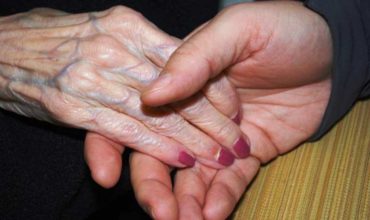Teepa Snow talks about how make visits valuable and positive.
Good morning everybody how’s the volume on this is this going to work for everybody they’re making a video for you if later on you want a copy of this Clark says that you can get a copy all you have to do is contact folks and they will be able to make it available to you.
Okay so what we’re talking about this morning we’re talking about visits but we’re also talking about challenging behaviors and my point in talking about both these things is my goal when somebody in your life develops some form of dementia whether it’s Alzheimer’s or another type of dementia you need to learn how to do more than just survive.
This disease and the reason you want to do more than just survive this disease as a person in this individuals life is it’s a long process it is very very long in most cases on average it’s 8 to 12 years that the person is going to go from first symptoms to end-of-life and that’s a long time to be in survival mode.
I will also tell you human beings are not meant to just survive because if you just go into survival all the time you are not the kind of person that somebody with dementia wants to be around because you turn into your mother on a bad day you turn into your father when he was really upset because when we go into survival mode our brains change and when our brains change that way
it is a very unhealthy change not only for the person we’re caring for but for us and the bad news about us those of us who are caregivers for people with dementia raise your hand if you are you either direct or
it’s a family member it’s a friend and down in this area I’m finding there’s a lot of folks who are friends who are having to deal with the issues of a friend they really care about who’s showing signs of the disease and when that’s the case you’re having to learn how to cope with somebody who used to be one way and is now being somewhere else in some way else and sometimes
they’re just like they used to be and sometimes they’re not and so what it requires of you is a flexibility that there may be days you don’t feel like being but I’m gonna tell you something on those days stay home on those days make a decision to keep yourself away from that person and
what I’m also going to tell you is on though days you better have somebody else to call on to step forward to be a friend to that individual when you can’t do it because when we are caregivers of people with dementia
we actually increase our own risk of developing dementia why do you think that might be why just why do you think that it might be that when you care gift for somebody with dementia that it turns out that your risk factors are higher
why I don’t understand it myself you’re only doing it 24/7 for years what am I supposed to say well that’s beyond me you know my point in bringing this up is very often when we’re caregivers one of the reasons it’s suspected that our risk goes up is guess what we live with a lot stress and stress is a risk factor for developing dementia
and it’s turning out it’s a pretty significant risk factor people who have PTSD post-traumatic stress disorder actually increase their risk of dementia by about 50 percent compared to their peers and so when you’re a caregiver and you can’t figure out how to manage how you’re feeling in a positive way and learn coping strategies that are positive guess what happens to all those feelings anger oh shut up I mean now those of you who have not seen me present
I roleplay and mess with your minds a lot and so he knew that and he set up here so oh well you know he knew what he was getting into if at any point you don’t want to role play back with me when I’m trying to get you to sort of try something out I’m do this go ahead and practice do this right now what is this in sports now here’s the nice thing about me
I don’t actually have dementia as of right now to the best of our knowledge so if you do this I will quit doing what I’m doing because I’ll be respectful of the cue that you just gave me that you don’t want to do this what’s the problem when people have dementia you give that cue all day long
it’s not going to do you bit of good except what are you doing with the big we put that tea and get out of my way what happens is we need to learn to cope better because they can’t okay so we’re going to come back to that but my goal really for you is that we need to really start talking about this more intensely one of the things
I find that is once you understand this disease in a greater depth and you have a greater appreciation for where they’re coming from it frequently will allow you to behave differently and the reason is once you understand why they’re doing what they’re doing it changes
how you look at what they’re doing and it gives you that little bit of perspective that you need sometimes to take that step back and realize they don’t realize they’ve asked me the same question 22 times in the car on the way to the doctor’s office I know that so instead of saying what time did I tell you the appointment was mom what time instead I will choose a different behavior in the behavior
I will choose is it’s a 12:30 yeah yeah hey listen there’s this song that I wanted to ask you if you remember now I want to point out that I’m fooling around but not really because when she’s asked me that’s that same question for 22 times what happens to your body your tension builds up and what you’re going to find is you start holding your jaw really tight and you start holding your body really still because you’re really afraid you’re going to what lose it and
so you’re driving like this now go ahead and get that facial thing going on hold yourself really tight go ahead try it get your arms out there hold on to the steering wheel and you understand you’re gripping the steering wheel really tight and you’re grinning like this because you don’t really want to say what’s right behind your teeth okay so you’re like this now here’s the piece that you don’t realize you’re getting all this stuff go ahead and tighten up a little bit
what I what you don’t realize is you’re now holding your breath and although you’re breathing in a little bit you’re never breathing out and because you keep breathing in but not breathing out what you’re starting to do is Dee oxygenate your brain you’re not getting oxygen to your brain and when your brain doesn’t get oxygen one of the very first places that gets distressed is your emotional control center and your frontal part which is where you make good choices and decisions which is why very shortly you’re going to say what time
did I tell you if you don’t learn a new strategy so when you’re visiting with someone who has dementia when you’re struggling with someone who has dementia when their behavior is really getting on your nerves I want you to realize the very first thing I did is try to take care of myself so I can take care of them and I realize that
I’m not breathing and that’s one of the first things to recognize you’re not breathing you’re breathing in but you’re not breathing out you’re holding on to it so what you’re going to do now try that I want you to breathe in through your nose like that and suck it suck it in and make a little purse lips and you better do it again
I don’t think you’re ready to talk yet roll your shoulders a little bit on that one okay and now let’s try one more time breathe in one more time and blow out now
what I want you to realize is what you took or what are called three deep cleansing breaths and they did a little research study and they looked at caregivers for people with dementia and they compared to not caregivers and what they found is our stress level is higher than the average bear and what they did is they found that our cortisol level negative stress hormone that causes your blood pressure to go up your blood sugar to be less well controlled your blood your heart rate to race your cholesterol levels to jump up
which is all this is really good if you’re being chased by a tiger not really good when you’re living with somebody for thirty years or twenty years or ten years or 12 years it’s actually very dangerous for your system to keep those things like that what happens is when your cortisol level is high your body starts having some issues and anybody who’s a caregiver how many of you have hypertension blood pressure problems that you didn’t use to have how many of you gained weight how many of you have have been recognizing your blood sugars are harder to control how many
I mean and what’s happening is that you’re stressed a lot of the time and so when we’re going to do a visit if when you’re thinking about spending time with the person you care about or you’re thinking about trying to help you’re already feeling yourself go okay well this is going to be a disaster every time I ask her to look about the bathroom she starts with I guess my hand and I know
she didn’t just go I know it’s going to be a problem I know she’s probably wet and I try to help her change and we have a fight okay so if that’s the case and you already know that going in who needs to do something different and the first thing to do different is to get yourself ready for this because if you’re going to come and visit if you’re going to spend time you need to think about you before you think about the person with dementia because it’s a two-way street and people with dementia are just like everybody else





